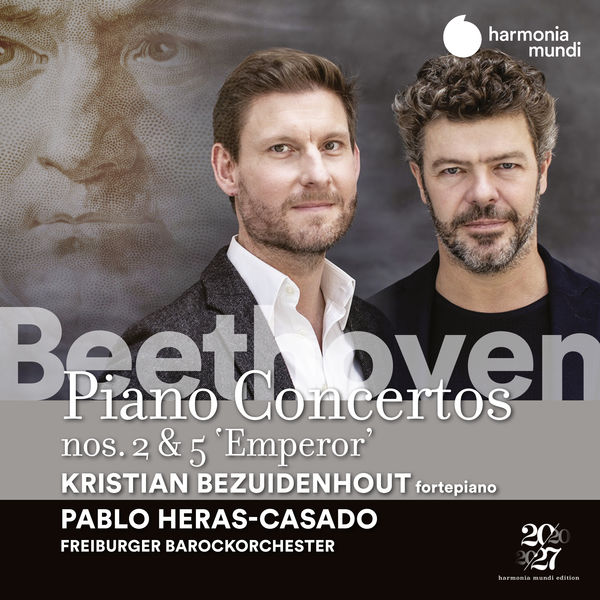
Streaming ilimitado
Escute agora este álbum em alta qualidade nos nossos aplicativos
Iniciar meu período de teste e começar a escutar este álbumCurta este álbum nos aplicativos Qobuz com a sua assinatura
AssinarCurta este álbum nos aplicativos Qobuz com a sua assinatura
Searching for clues in the historical record of how Beethoven played his first four piano concertos, Kristian Bezuidenhout considered the spontaneous nature of some of the premiere performances and has extrapolated options for his own interpretations. Beethoven's cadenzas were initially improvised, emulating Mozart's practice, and this contributed to his reputation as a pianist to watch in the late 1790s. Reflecting Beethoven's eagerness to impress the public with demonstrations of his exceptional virtuosity and invention, the early concertos quickly made him a celebrity in Vienna and across Europe. For this 2020 release on Harmonia Mundi, Bezuidenhout joins Pablo Heras-Casado and the Freiburger Barockorchester in period-style performances of the Piano Concerto No. 2 in B flat major, Op. 19 (1798), which Beethoven played, and the Piano Concerto No. 5 in E flat major, "Emperor," Op. 73 (1809), which he did not, having become profoundly deaf by that time and unable to hear the orchestra or his own part. Bezuidenhout plays a fortepiano, a modern copy of an 1824 Graf instrument, and he is accompanied by a small but robust chamber orchestra that permits a fair competition with the lean, metallic sound of the keyboard. This works reasonably well in the Piano Concerto No. 2, where the music accords with this balance, and Bezuidenhout plays his transcription of Robert Levin's improvised cadenza, which was recorded in 1999 with John Eliot Gardiner and the Orchestre Révolutionnaire et Romantique. However, the sound of the fortepiano seems at times insufficient for the "Emperor," which is cast in Beethoven's heroic mold and seems unnecessarily thin and tinny in this recording, despite the opportunity Bezuidenhout had to use a different and stronger sounding instrument, which he turned down for musical and logistical reasons. Harmonia Mundi's recording is clear and focused, and tends to favor the orchestra over the fortepiano, especially in the Piano Concerto No. 5.
© TiVo
Você está escutando amostras.
Escute mais de 100 milhões de músicas com um plano de streaming ilimitado.
Escute esta playlist e mais de 100 milhões de músicas com os nossos planos de streaming ilimitado.
A partir de 8,99€/mês

Piano Concerto No. 5 in E-Flat Major, Op. 73, 'Emperor' (Ludwig van Beethoven)
Ludwig van Beethoven, Composer - Kristian Bezuidenhout, Soloist, MainArtist - Freiburger Barockorchester, Orchestra, MainArtist - Pablo Heras-Casado, Conductor, MainArtist
2020 harmonia mundi 2017 harmonia mundi
Ludwig van Beethoven, Composer - Kristian Bezuidenhout, Soloist, MainArtist - Freiburger Barockorchester, Orchestra, MainArtist - Pablo Heras-Casado, Conductor, MainArtist
2020 harmonia mundi 2017 harmonia mundi
Ludwig van Beethoven, Composer - Kristian Bezuidenhout, Soloist, MainArtist - Freiburger Barockorchester, Orchestra, MainArtist - Pablo Heras-Casado, Conductor, MainArtist
2020 harmonia mundi 2017 harmonia mundi
Piano Concerto No. 2 in B-Flat Major, Op. 19 (Ludwig van Beethoven)
Ludwig van Beethoven, Composer - Kristian Bezuidenhout, Soloist, MainArtist - Freiburger Barockorchester, Orchestra, MainArtist - Pablo Heras-Casado, Conductor, MainArtist
2020 harmonia mundi 2017 harmonia mundi
Ludwig van Beethoven, Composer - Kristian Bezuidenhout, Soloist, MainArtist - Freiburger Barockorchester, Orchestra, MainArtist - Pablo Heras-Casado, Conductor, MainArtist
2020 harmonia mundi 2017 harmonia mundi
Ludwig van Beethoven, Composer - Kristian Bezuidenhout, Soloist, MainArtist - Freiburger Barockorchester, Orchestra, MainArtist - Pablo Heras-Casado, Conductor, MainArtist
2020 harmonia mundi 2017 harmonia mundi
Resenha do Álbum
Searching for clues in the historical record of how Beethoven played his first four piano concertos, Kristian Bezuidenhout considered the spontaneous nature of some of the premiere performances and has extrapolated options for his own interpretations. Beethoven's cadenzas were initially improvised, emulating Mozart's practice, and this contributed to his reputation as a pianist to watch in the late 1790s. Reflecting Beethoven's eagerness to impress the public with demonstrations of his exceptional virtuosity and invention, the early concertos quickly made him a celebrity in Vienna and across Europe. For this 2020 release on Harmonia Mundi, Bezuidenhout joins Pablo Heras-Casado and the Freiburger Barockorchester in period-style performances of the Piano Concerto No. 2 in B flat major, Op. 19 (1798), which Beethoven played, and the Piano Concerto No. 5 in E flat major, "Emperor," Op. 73 (1809), which he did not, having become profoundly deaf by that time and unable to hear the orchestra or his own part. Bezuidenhout plays a fortepiano, a modern copy of an 1824 Graf instrument, and he is accompanied by a small but robust chamber orchestra that permits a fair competition with the lean, metallic sound of the keyboard. This works reasonably well in the Piano Concerto No. 2, where the music accords with this balance, and Bezuidenhout plays his transcription of Robert Levin's improvised cadenza, which was recorded in 1999 with John Eliot Gardiner and the Orchestre Révolutionnaire et Romantique. However, the sound of the fortepiano seems at times insufficient for the "Emperor," which is cast in Beethoven's heroic mold and seems unnecessarily thin and tinny in this recording, despite the opportunity Bezuidenhout had to use a different and stronger sounding instrument, which he turned down for musical and logistical reasons. Harmonia Mundi's recording is clear and focused, and tends to favor the orchestra over the fortepiano, especially in the Piano Concerto No. 5.
© TiVo
Sobre o álbum
- 1 disco(s) - 6 faixa(s)
- Duração total: 01:03:24
- 1 Folheto digital
- Artistas principais: Kristian Bezuidenhout Freiburger Barockorchester Pablo Heras-Casado
- Compositor: Ludwig van Beethoven
- Gravadora: harmonia mundi
- Género: Clássica Música de concerto
2020 harmonia mundi 2017 harmonia mundi
Destaques:
Melhorar as informações do álbum
